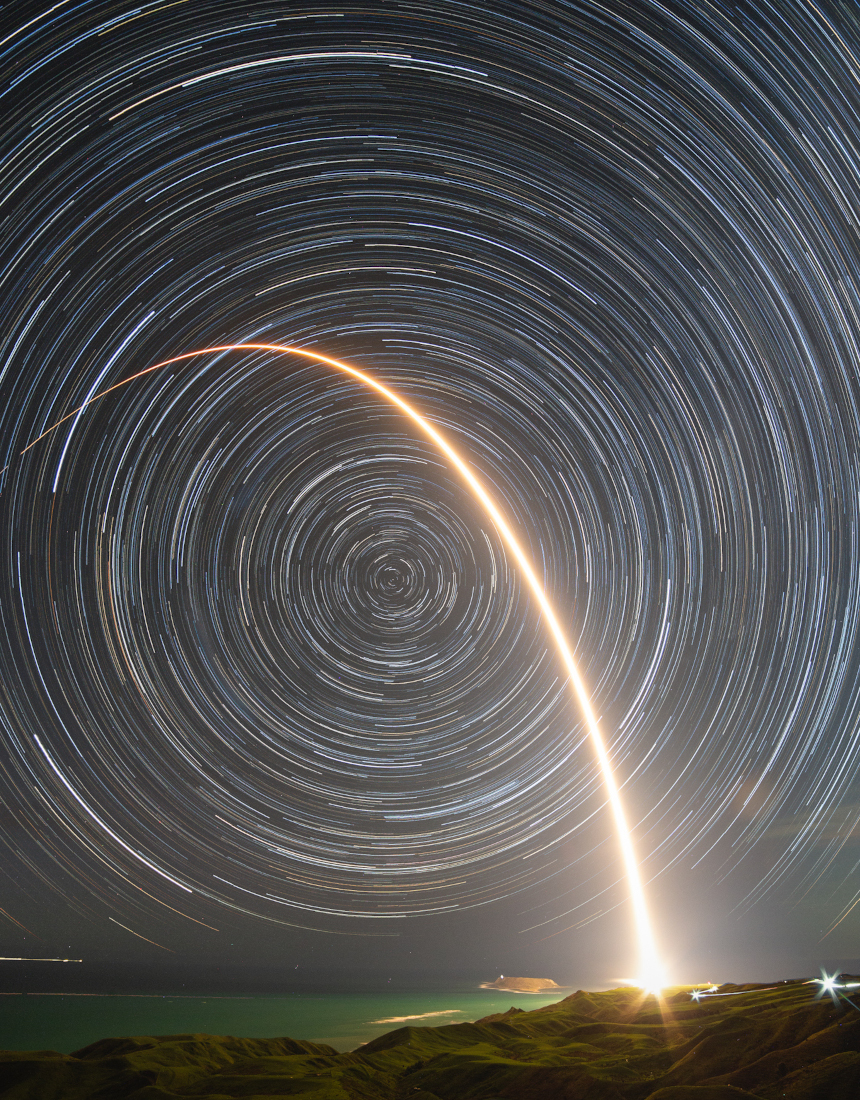17. August 2024
規夜空 ê 仝心光弧

探索宇宙1!逐工會揀一幅無仝款 ê 影像抑是相片,𤆬你熟似咱這个迷人 ê 宇宙,閣有專業天文學者2為你3解說4。
- 原始文章:Sky Full of Arcs
- 影像來源 kah 版權:Rory Gannaway
- 天文相片:2024 年 英仙座流星雨 kah 極光
- 台文翻譯:An-Li Tsai (NSYSU)
[漢羅] 規夜空 ê 仝心光弧
火箭實驗室 ê 電子號火箭 tī 8 月 11 這工 ùi 地球發射。 電子號火箭 ê 任務叫做「飛過規个天頂 ê SAR」,SAR ê 全名是「合成孔徑雷達」,是一台細台人造衛星。 這台火箭載 SAR ùi 紐西蘭 北島 ê Mahia 半島 發射,飛到 低地球軌道 頂懸遐。 火箭 發射 ê 軌跡媠甲,ùi 南部海岸 向 東爿天頂 飛過去。 這張合成相片是 kā 2.5 點鐘 內 ê 50 張連紲感光影像 疊出來 ê 結果。 固定 tī 三跤馬 頂懸 ê kha-mé-lah 翕--ê 方向是 南天極,就是 地球自轉軸 延伸到天頂 ê 方位。 毋過南半球 ê 夜空 無較光 ê 天星 通紀錄這个方位。 就算是按呢,南天極 猶是真好揣。 伊就 tī 天頂遮爾濟 天星軌跡 ê 仝心弧中心。
[POJ] Kui Iā-khong ê Kāng-sim Kng-hô͘
Hóe-chìⁿ si̍t-giām-sek ê Tiān-chú-hō hóe-chìⁿ tī 8 goe̍h 11 chit kang ùi Tē-kiû hoat-siā. Tiān-chú-hō hóe-chìⁿ ê jīm-bū kiò-chò "Poe kòe kui-ê thiⁿ-téng ê SAR", SAR ê choân miâ sī "Ha̍p-sêng Khóng-kèng Lûi-ta̍t", sī chi̍t tâi sè tâi jîn-chō ūi-chhiⁿ. Chit tâi hóe-chìⁿ chài SAR ùi Niú-se-lân pak-tó ê Mahia poàn-tó hoat-siā, poe-kàu kē Tē-kiú kúi-tō téng-koân hia. Hóe-chìⁿ hoat-siā ê khúi-jiah súi kah, ùi lâm-pō͘ hái-hōaⁿ hiòng tang-pêng thiⁿ-téng poe kòe-khì. Chit-tiuⁿ ha̍p-sêng siòng-phìⁿ sī kā 2.5 tiám-cheng lāi ê 50 tiuⁿ liân-sòa kám-kng iáⁿ-siōng tha̍h chhut-lâi ê kiat-kó. Kò͘-tēng tī saⁿ-kha-bé téng-koân ê kha-mé-lah hip--ê hong-hiòng sī Lâm-thian-ke̍k, to̍h-sī Tē-kiû chū-choán-te̍k iân-sin kàu thiⁿ-téng ê hong-ūi. M̄-koh lâm-pòaⁿ-kiû ê iā-khong bô khah kng ê thiⁿ-chhiⁿ thang kì-lo̍k chit-ê hong-ūi. Tiō-sǹg-sī án-ne, Lâm-thian-ke̍k iáu-sī chin hó-chhōe. I to̍h tī thiⁿ-téng chiah-nī chē thiⁿ-chhiⁿ khúi-jiah ê kāng-sim-hô͘ tiong-sim.
[KIP] Kui Iā-khong ê Kāng-sim Kng-hôo
Hué-tsìnn si̍t-giām-sik ê Tiān-tsú-hō hué-tsìnn tī 8 gue̍h 11 tsit kang uì Tē-kiû huat-siā. Tiān-tsú-hō hué-tsìnn ê jīm-bū kiò-tsò "Pue kuè kui-ê thinn-tíng ê SAR", SAR ê tsuân miâ sī "Ha̍p-sîng Khóng-kìng Luî-ta̍t", sī tsi̍t tâi sè tâi jîn-tsō uī-tshinn. Tsit tâi hué-tsìnn tsài SAR uì Niú-se-lân pak-tó ê Mahia puàn-tó huat-siā, pue-kàu kē Tē-kiú kuí-tō tíng-kuân hia. Hué-tsìnn huat-siā ê khuí-jiah suí kah, uì lâm-pōo hái-huānn hiòng tang-pîng thinn-tíng pue kuè-khì. Tsit-tiunn ha̍p-sîng siòng-phìnn sī kā 2.5 tiám-tsing lāi ê 50 tiunn liân-suà kám-kng iánn-siōng tha̍h tshut-lâi ê kiat-kó. Kòo-tīng tī sann-kha-bé tíng-kuân ê kha-mé-lah hip--ê hong-hiòng sī Lâm-thian-ki̍k, to̍h-sī Tē-kiû tsū-tsuán-ti̍k iân-sin kàu thinn-tíng ê hong-uī. M̄-koh lâm-puànn-kiû ê iā-khong bô khah kng ê thinn-tshinn thang kì-lo̍k tsit-ê hong-uī. Tiō-sǹg-sī án-ne, Lâm-thian-ki̍k iáu-sī tsin hó-tshuē. I to̍h tī thinn-tíng tsiah-nī tsē thinn-tshinn khuí-jiah ê kāng-sim-hôo tiong-sim.
[English] Sky Full of Arcs
On August 11 a Rocket Lab Electron rocket launched from a rotating planet. With a small satellite on board its mission was dubbed A Sky Full of SARs (Synthetic Aperture Radar satellites), departing for low Earth orbit from Mahia Peninsula on New Zealand's north island. The fiery trace of the Electron's graceful launch arc is toward the east in this southern sea and skyscape, a composite of 50 consecutive frames taken over 2.5 hours. Fixed to a tripod, the camera was pointing directly at the South Celestial Pole, the extension of planet Earth's axis of rotation in to space. But no bright star marks that location in the southern hemisphere's night sky. Still, the South Celestial Pole is easy to spot. It lies at the center of the concentric star trail arcs that fill the skyward field of view.
詞彙學習
| 漢羅 | POJ | KIP | 華語 | English |
|---|---|---|---|---|
| 電子號火箭 | Tiān-chú-hō hóe-chìⁿ | Tiān-tsú-hō hué-tsìnn | 電子號火箭 | Electron rocket |
| 火箭 | hóe-chìⁿ | hué-tsìnn | 火箭 | rocket |
| 合成孔徑雷達 | SAR Ha̍p-sêng Khóng-kèng Lûi-ta̍t | SAR Ha̍p-sêng Khóng-kèng Lûi-ta̍t | SAR 合成孔徑雷達衛星 | Synthetic Aperture Radar (SAR) |
| 低地球軌道 | kē Tē-kiû kúi-tō | kē Tē-kiû kuí-tō | 低地球軌道 | low Earth orbit |
| 三跤馬 | saⁿ-kha-bé | sann-kha-bé | 三腳架 | tripod |
| 南天極 | Lâm-thian-ke̍k | Lâm-thian-ki̍k | 南天極 | the South Celestial Pole |
| 南半球 | lâm-pòaⁿ-kiû | lâm-puànn-kiû | 南半球 | southern hemisphere |
| 自轉軸 | chū-choán-te̍k | tsū-tsuán-ti̍k | 自轉軸 | axis of rotation |
| 仝心弧 | kāng-sim-hô͘ | kāng-sim-hôo | 同心弧 | concentric arcs |